When going boating, it’s important to make sure you have the right equipment on board. Not only to get yourself out of trouble if something happens but also to have a comfortable and fun trip on the water.
So I have prepared a list of what you need on a boat to help you plan a safe and enjoyable boat trip.
Before you begin reading, know that every country has different rules concerning safety equipment. Also, the regulation can vary depending on the type and size of the vessel. Therefore, you will have to check with your state regulations before buying anything.
Required Safety Equipment
1. Life jacket
A life jacket can save your life if something goes wrong, so even if you don’t like to wear it, wear it anyway. However, you must carry at least one U.S. Coast Guard-approved PFD type I, II, III, or IV for each passenger on board.
Note that if your boat is 16 feet or longer, you’ll need one Type IV throwable flotation device per person in addition to the wearable PDF. Your life jacket should fit properly and be reliably accessible.
If you have children under 13 years old on board, they must wear an approved U.S. Coast Guard life jacket when the boat is underway unless they are under deck or in an enclosed cabin.

2. Sound Device
A sound device is required onboard, and there are good reasons for this because it plays an important role in your safety and your loved ones. The Coast Guards always check you hold one and ensure it works properly. If you have a recreational boat less than 39 feet (12 meters), you must carry a bell, a whistle, or a horn on board. If your vessel is 39 feet or more in length, you must have a whistle or a horn and a bell to let other boats hear you from a one-half mile away, and the sound must last 4 to 6 seconds.

3. Flashlights
A flashlight is required on most boats. If your boat’s lights burn out or the visibility is limited, a flashlight will come in handy and prevent a collision or any other accident. It’s best to keep the flashlight in a dry place and ensure the batteries work properly.
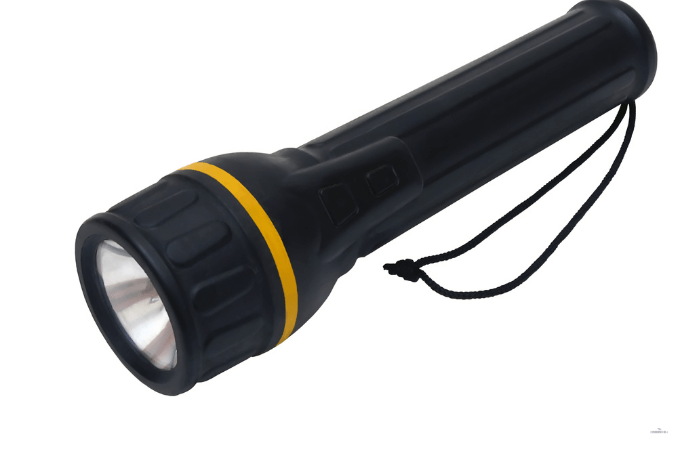
4. Fire Extinguishers
According to the U.S. coast guard, all motorboats must have fire extinguishers on board, easily accessible. However, the number and size of fire extinguishers you’ll need will depend on several factors, such as the size of your boat and whether or not you have a fixed extinguishing system. On the other hand, outboard recreational vessels less than 26 feet in length that don’t have any fuel tank installed and don’t carry passengers for commercial purposes are not required to carry fire extinguishers. But hey, it’s better safe than sorry. So hold one when you go boating.

5. Distress Signals
A Visual distress signal known as a flare is a device that will help other boats or airplanes spot you from far away in case you get into trouble. There are various types of signal distress. Red handheld flares, which are for both day and night. Red parachutes or rocket flares for day and night. Electric distress for the night only and Orange signal flag for the day only.
All boats that navigate in coastal waters, the great lakes, or international waters must carry a minimum of 3 devices for day and night. However, only boats under 16 feet or open sailboats less than 26 feet in length with no engine, canoes, or kayaks that operate during the day don’t need to carry visual distress signals – unless they navigate during the night, an electric distress light will be necessary.
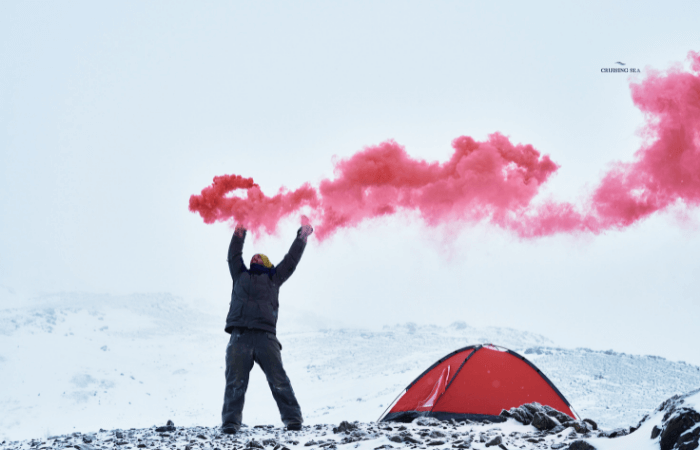
6. Dock lines
Another important piece of equipment to have onboard is a dock line. A dock line is a sturdy cord that will help you secure your boat to a dock and secure it in place in strong winds. Dock lines made of Nylon are the favorite among boaters because they are durable, UV-resistant, stretchy, and easy to manipulate.

7. First aid kit
A first aid kit isn’t required on boats by law, but this is an item you must have on board when you venture offshore. It doesn’t matter how long and where you go boating; make sure you carry a first aid kit on your boat. Some health accidents can happen along the way, such as burns, cuts, and seasickness, to name a few. You’ll be glad to have it if needed. It would be preferable to store your aid kit in a dry waterproof container to protect it from water, and if you can, keep it where you have easy access in case of emergency.

8. Bucket Firefighting
Fire buckets are great to have onboard to fight a fire. However, not all boats are required to carry them. For instance, pleasure crafts more than 39.4 feet (12 meters) in length don’t have to carry bucket fires. Only recreational boats between 39.4 feet to 78.7 feet (12m up to 24 m) in length must have two fire buckets onboard.
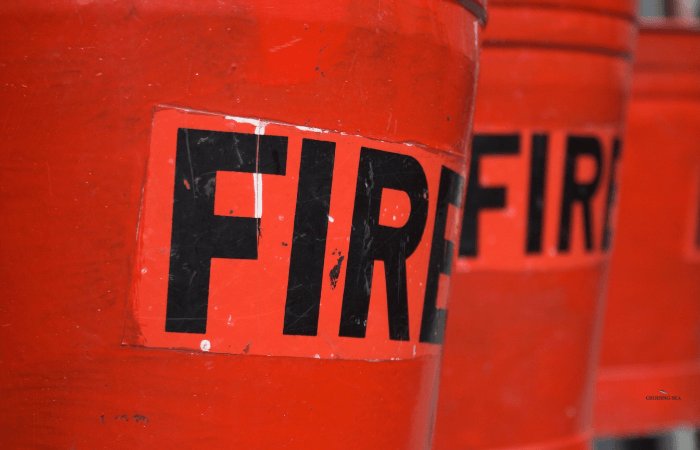
9. Paddles
A paddle may be useless on a 24 feet boat but can certainly be helpful on a 16 feet boat if you encounter an issue with the engine.

10.Local chart(s)
Unless your boat weighs less than 100 tons or you have enough knowledge of your local waterway, the law doesn’t require carrying a local chart. However, it’s always best to have one on board for your safety and peace of mind.

11.Marine Sanitaire Device
It’s not required to have a toilet on board, but let’s face it, it’s practical. However, if your boat is less than 65 feet in length and has one installed, it must be connected to a Coast Guard-approved Type I, II, or III marine sanitation device. If it’s a portable toilet, it doesn’t need to be Coast Guard Certified since it requires very little maintenance.
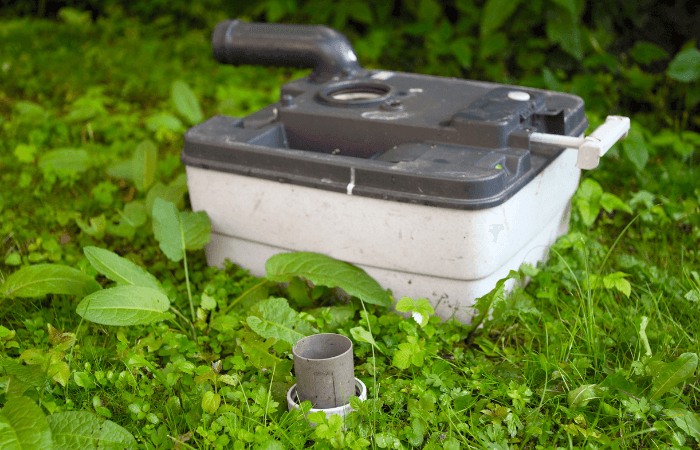
12. Fenders
Boat fenders are must-have equipment onboard. When docking or anchoring your boat, they will protect your hull from scratches, pilings, and other damages – they act as shock absorbers. So always ensure you have the right amount, size, and type of boat fender onboard.

13. Boathook
Although boats less than 26 feet in length don’t have to carry a boat hook, having one on board will always come in handy when docking, undocking, or picking up items.

14. Tools
A tool kit is very important onboard. You never know when you’ll need it, but you’ll be glad to have it when you do need it most. However, the essential components of a tool kit usually include pliers, knives, screwdrivers, files, and a saw. Those tools can quickly get rust when in contact with water, so it would be best to keep the kit in a waterproof, closed container.
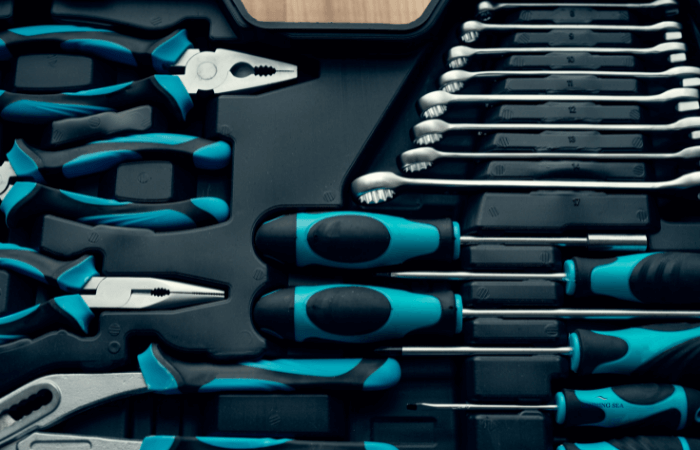
15. Water and food
When heading out on the water, it’s crucial to provision your boat correctly. Make a list of food you’ll need for your boat trip, and bring enough water to stay hydrated.

16. Bimini Boat
A bimini top provides refreshing shade on hot days and good protection against the sun. They are easy to mount and store when not in use. The darker colors offer better U.V. rays protection than the light colors because they contain more dyes in the fabric. On the other hand, dark tops absorb more heat than bright tops.
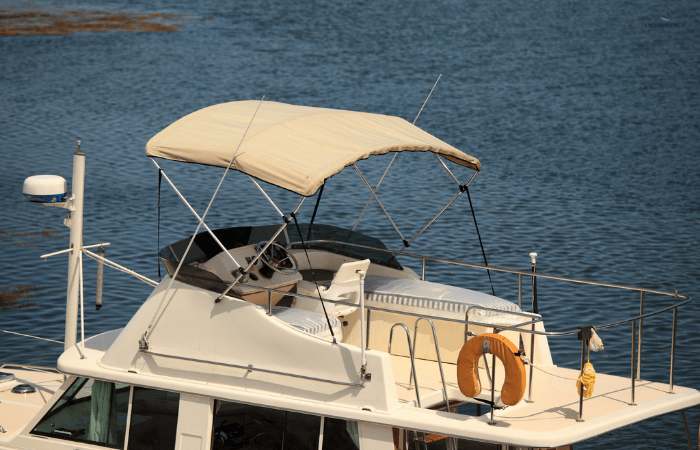
17. Long Sleeve Shirts
Even with the proper sunscreen, you don’t get 100 percent protection from the sun. The UV rays can still get through your skin. So you better wear a long sleeve shirt on top of the sunscreen, preferably dark colors, as they tend to block the UV rays better.

18. Sunscreen
We all know that the sun is dangerous for the skin, but at sea, it’s even more dangerous. You barely feel the heat in the wind, and when you are in the water, you feel it even less. So you must have good sunscreen with at least SPF 40. Never go without it.

19. Sunglasses
The sunlight reflects on the water and creates a blinding glare, which can cause headaches and even damage your eyes. Besides, sunglasses give a nice stylish look, especially on boats. So, ensure your sunglasses have polarised lenses to protect against UV rays.
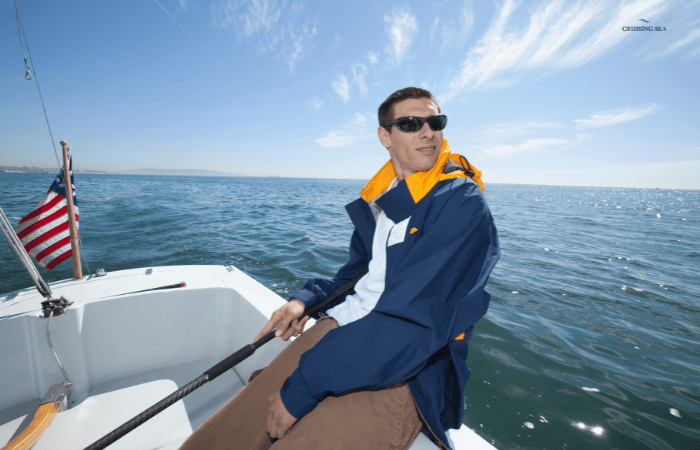
20. Hat
Wearing a hat is essential to have a safe and pleasant boating trip. If your head is exposed to the sun, you can become dehydrated and get a severe headache, which you want to avoid. There are many types of hats, but if you want maximum protection, choose one that covers your neck, ears, and head. You also want it to have a chin strap to not blow off your head with the wind and a mesh band for maximum airflow.
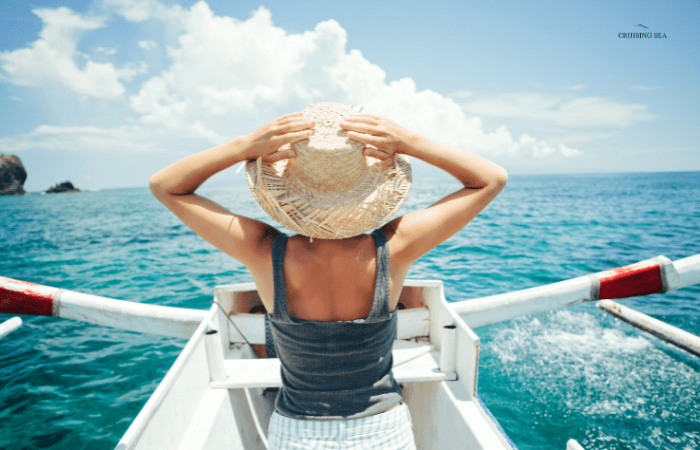
21. Dry Bag
A dry bag will be your best friend on the water as it will keep all your stuff completely dry and safe even if it gets submerged. The great thing about dry bags is that they are extremely versatile. You can use them as a pillow, a floating device, or a cooler. And you can count on it to keep your beer cold for several hours.

22. Binocular
Binoculars are one of the most important devices on your boat because they allow you to identify things you wouldn’t be able to see without them—for example, rocks, waves breaking, cardinal, and other boats, which can prevent serious accidents.
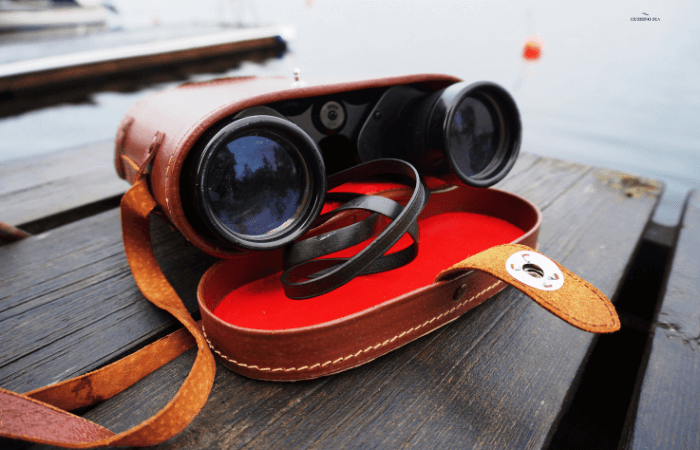
23. Mosquito repellent
mosquitoes can become a problem when going out on the water, especially if you anchor your boat near the shore. Mosquitoes get more active early in the morning or at sunset. To avoid mosquito bites, you have two options. Get offshore, position your boat where you get the most wind or use mosquito repellent. Natural repellents such as Citronella, Lavender, and Cinnamon oil work exceptionally well and are not harmful to the skin.

24. Extra clothes
It’s easy to get wet on a boat, so it’s always good to have a waterproof rain jacket and some extra clothes. The weather can change suddenly, or you may want to have fun on land. It can get chilly in the early morning and evening at sea, so think about taking a light jacket.
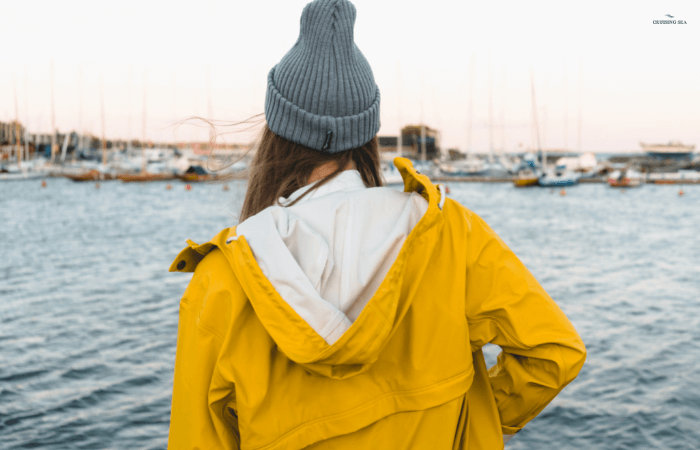
25. Snorkeling and swimwear gear
Snorkeling and swimming are part of the fun while boating.
If you don’t have snorkeling gear on board, you won’t be able to explore the beautiful underwater world. Wouldn’t it be a shame? Besides, you’ll need snorkeling gear if you have to make a few emergency underwater repairs to your boat.

26. Beach towels
A must item for any boating excursion is a beach towel. But not just any. You need a towel that is soft, lightweight and dries fast. A microfiber towel is a perfect choice for boating trips as it has all the characteristics mentioned above. In addition, it barely takes up space in your bag, making it easy to carry everywhere.
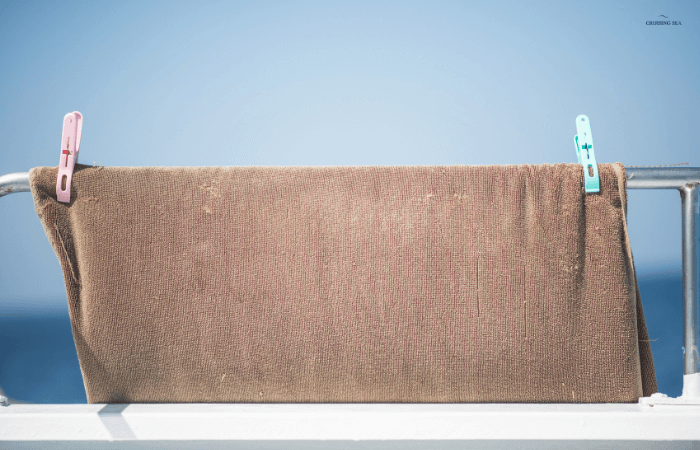
27. Spare Propeller
Wouldn’t it be a shame to shell out hundreds of dollars for a spare prop and leave it in your garage? Of course, yes. So bring the prop, and don’t forget the tools to change it because it will get you home safe. It’s better to have one and not need it than need one and not have it.

28. Batteries
For your peace of mind, It’s best to have spare batteries fully charged along for the ride. Imagine that you are a couple of miles away from the shore, and your motor doesn’t start. How would you feel? Not so well, I guess. How many spare batteries should you have on your boat? Well, it depends. For the ocean, it’s recommended to take at least 4—one for the accessories, one for cracking, and two for the motor. For inshore, you might not need them unless you want to carry them.

29. Cellular phone
Wireless Technology has dramatically improved over the years, and there are various ways you can get the internet on a boat today. For instance, you can either use a WI-Fi extender, get a cellular plan with a sim card, install satellite internet, or use a portable Mifi device.

30. Towable tube
Besides fishing, swimming, and snorkeling, you can also do tubing behind your boat. It’s fun, and if you have kids with you, they’ll love it. Just make sure to choose the right towable tube, as there are different types. Some are designed for speed, and others for slower rides. Also, you have to consider the size of your boat when buying a towable tube because once inflated, it becomes huge, and you might end up not having enough space onboard. However, when doing tubing, always wear a life jacket for your safety and a long sleeve shirt to avoid scratches and burns.

31. Driver’s License, registration card, and insurance
Unless you charter a crewed yacht, you’ll need to bring your boat registration, license, and insurance to operate the boat.
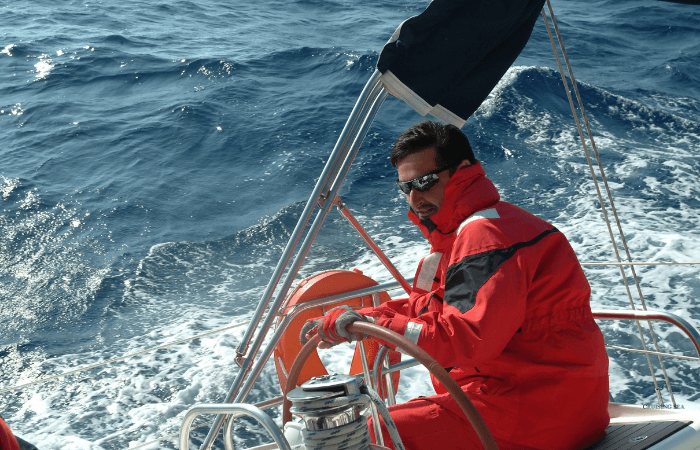
32. Fishing license
Many countries require a fishing license in those days. But there are some exceptions; thus, it would be wiser to check with your country if you need to carry a fishing license before you go angling.
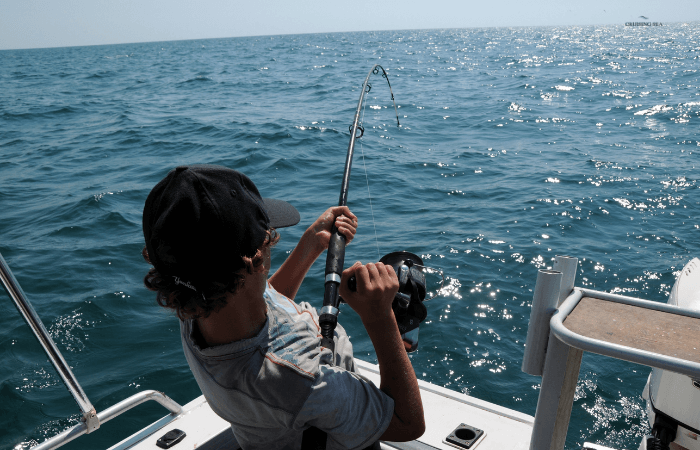
33. Anchor, cable chain
The marine law doesn’t require having an anchor on a boat. But if you want to have a safe boating trip, it would be better to have one. It doesn’t matter if you just troll, pull friends on a towable tube behind your boat, or cruise around in the area. If your boat suddenly dies and you don’t have an anchor, you can get in serious trouble. Besides, you need one if you plan to stop somewhere to have fun on land.
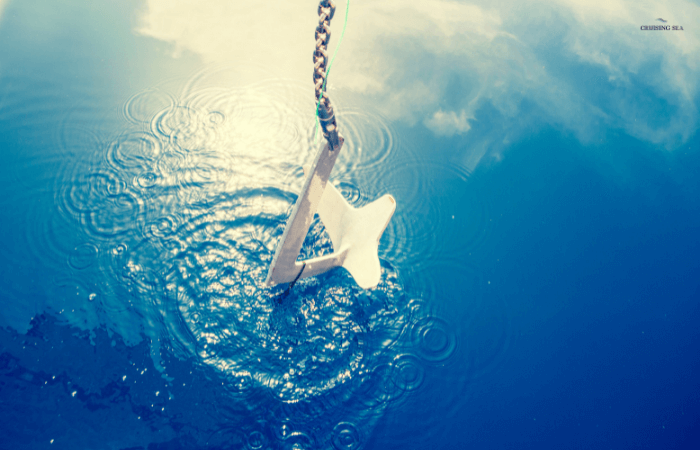
34. Bailing device
It doesn’t matter the type and length of the boat; it’s a must to carry a bailing device to remove the water inside the boat. A bailing device can be an eclectic or manual bilge pump or a bucket. Whatever bailing device you’ll use must be made of plastic or metal. And if you use a bucket, it must have at least 750ml and have an opening of 65cm2 in area.

35. Cookware
If you live on a boat or make long trips at sea, you would want to cook delicious food for the whole crew. For this, you need a good set of cookware that can nest neatly in the cupboard of your galley and that doesn’t rust with time. The Magma is one of the most popular cookware among boaters, but there are many other great sets of cookware for boats that are as good as the Magma.
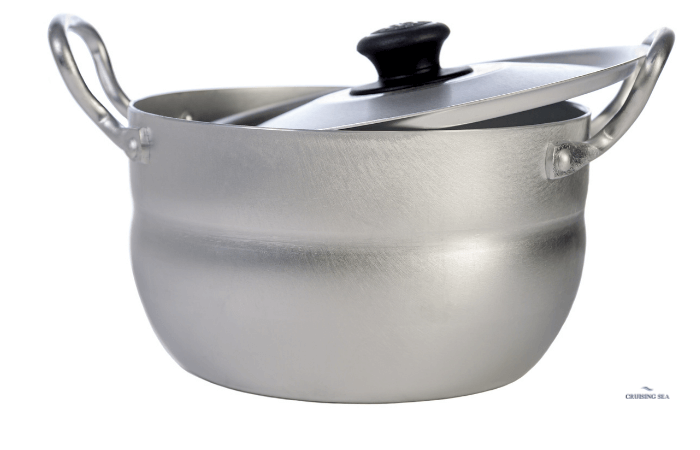
36. Cooler
Don’t even think about going boating without a cooler. No matter the size of your boat and the length of your trip, you need one to keep your food fresh and beverages cold. For a short trip, you can get away with a soft cooler, but for longer trips, a hard cooler will be your best bet.

37. Grill
Who says you can’t grill on a boat? Not only can you, but you should. With the proper marine grill, you’ll be able to make delicious meals right from your boat for all your friends and family. There is no need to go on land and spend a fortune in restaurants, and as a proverb says, we are never better served than by ourselves.
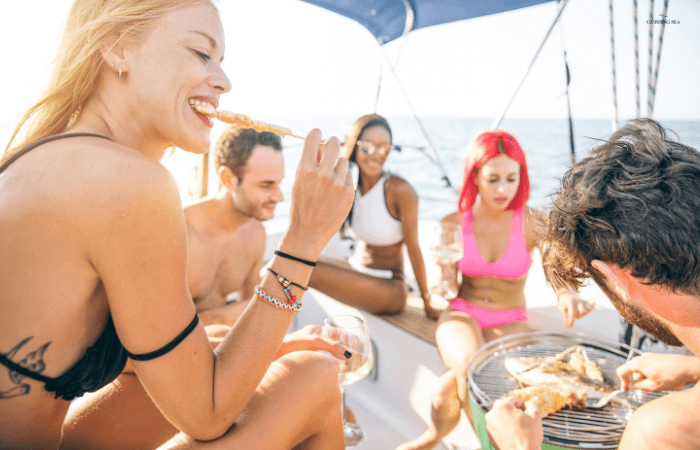
38. Boat Shoes
Many people don’t wear shoes on a boat, and in my opinion, it’s a mistake because they can get hurt badly. If you don’t want to injure your fingers or slip and fall, you should wear boat shoes with a non-marking and non-skid sole. If you boat in the summer, look for aerated sandals with toe box protection or water shoes.

39. VHF RADIO
This may sound surprising, but a VHF Radio isn’t legally required on recreational boats less than 65 feet in the U.S. However, if you want to sail with peace of mind and have a pleasant trip, you should consider getting one. You never know what can happen; a VHF Radio can save your life if an emergency arises. Plus, it helps you stay up to date as you constantly receive information from the Coast Guard about the traffic, weather, local situations, etc. Now the question is, what VHF Radio do you need? And the answer is it depends. If you plan to do some island hopping, installing a fixed, powerful VHF with a large antenna would be best. But if you don’t boat very far, you can get away with handheld VHF radio.
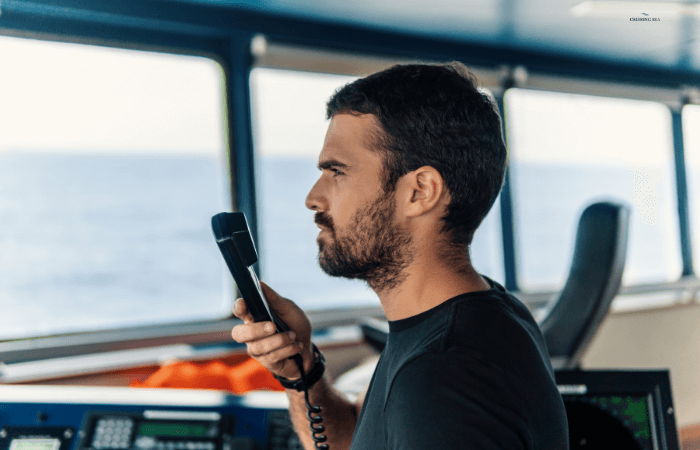
Final Word!
And Voila, these are all the things you need to have on your boat or almost everything. The list can go on, as there are so many tools, gadgets, and toys you can purchase. It never ends. However, what matters most is that you have all the required safety equipment on board. The rest is up to you to decide whether you want to add more boat accessories and gadgets to have more comfort and fun on your boat.
Want More Tips?
Subscribe to Cruising Sea newsletter to receive every two-week the latest post straight to your inbox!
- More articles
- Foul weather gear
- Dry bags for sailing
- Waterproof Duffel bags
- Life vest for dogs
- Life vests for boats
- Snorkeling gear

Daniella has been passionate about travel, the sea, and nature for many years. As a child, she frequently traveled throughout the Mediterranean and continued with her journeys throughout her adult life.
Her experiences have created the desire within her to share her love for traveling with other passionate and adventurers who want to discover beautiful horizons and new cultures.

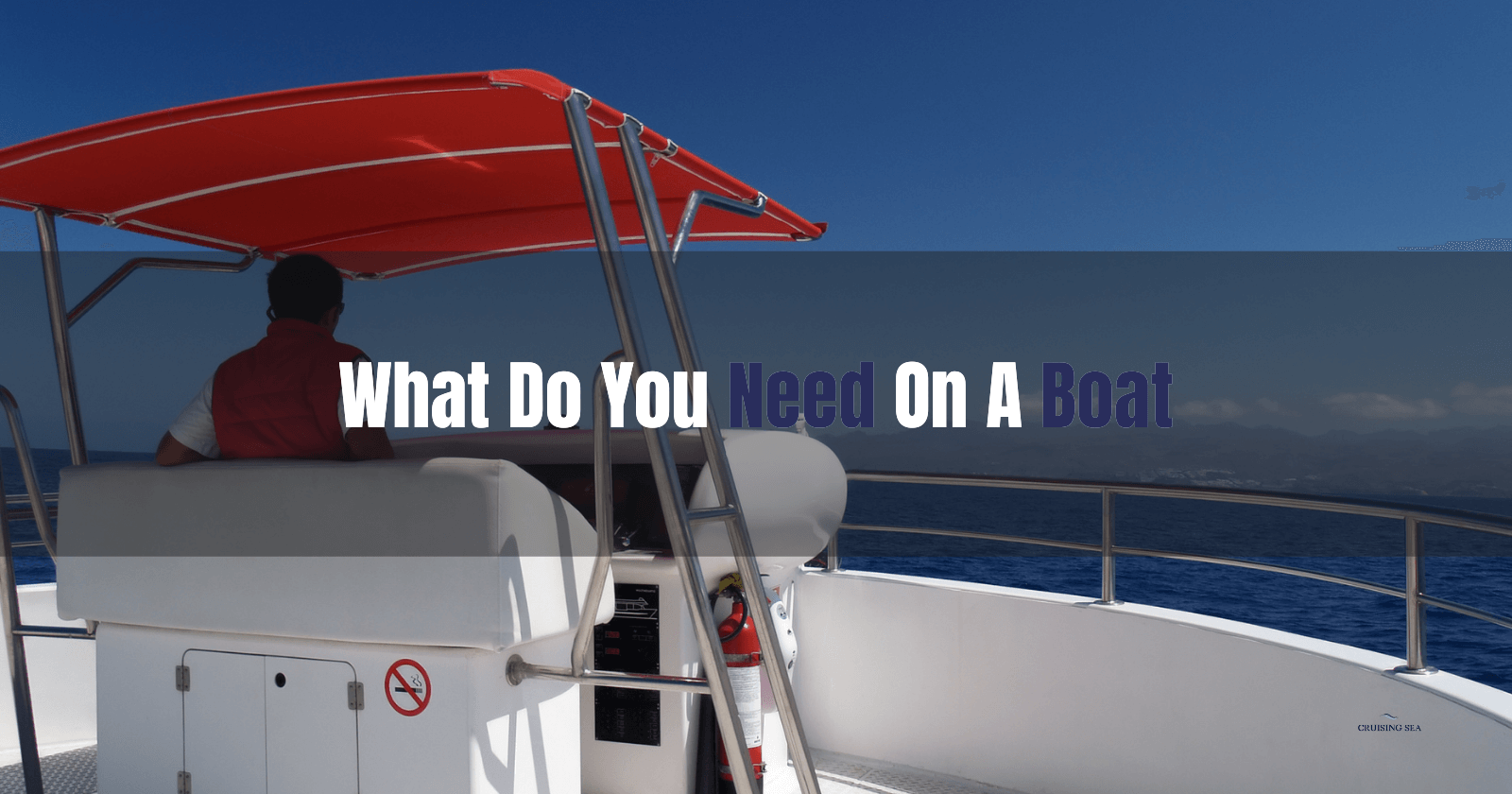
Thank you for sharing such an informative piece. I know of most of items discussed on this piece but I am happy to learn of the distress signal and sound device today. A whistle or horn is essential in case of accident, it can help the rescue mission. I also love the grill and food part very important too.
Hi Bethel,
Yes, you need to carry some safety types of equipment on a boat when venturing at sea or lakes. Hopefully, this list will help you plan your next trip on the water:)
If you have any questions, please let me know. I’ll be more than happy to assist.
Thank you for the comment, and I wish you a lovely day.
Excellent boating tips! With the tips that you have provided everyone who does on a boat trip will no doubt enjoy a safe and fun boating experience. I never went on a boat ride before but I’m eager to go on one when I get the chance.
There is a lot to see and explore in the open sea and ocean as well as meeting some creature friends.
Thanks for your tips!
Hi Terence,
You are welcome. I am glad you found the article helpful.
Yes, as you say, there are many things to see and do at sea. I hope you’ll have the chance to get on a boat soon.
If you have any questions, please let me know. I am always happy to assist.
Thank you for the comment, and I wish you a lovely day.
This a awesome blog about your needs; gadgets, tools, equipment you need on your long Boat trips.
It covers everything you can imagine.
It covers your needs in hot sun. If there is rain or storm, how do you protect yourself?
It is is a really long boat, how do communicate internally from one end to other end in case of an emergency? Could you have a common satellite connection of some kind. Just curious.
Thank you. It offers me a huge experience.
Hi Anusuya,
Well, this is an excellent question. To communicate, you need a VHF radio onboard as it will help you get help if you get in trouble. As a rule thumb, all boaters check the weather before getting out on the water. But if you get stuck in a storm, this is another story. Every situation is different, and the knowledge of the sailor will play an important role in handling the situation. He needs to be very knowledgeable about the safety equipment, water, geography, and winds. However, in this case, you need to get to the nearest marina or dock immediately, and there are some guidelines you must follow, which you learn in a boating safety course.
I hope it helped. If you have more questions, I’ll be more than happy to assist.
Thank you for the comment and I wish you a lovely day.
Very good post, and thank you for reminding me that I need to get my fishing license for the summer. At the same time…darn it…I gotta get my fishing license for the summer still lol. Also I might take you up on that suggestion of getting some cookware for a boating trip. I remember I used to get really fat back in the day while on boat trips with my dad because he would just buy a bunch of candy for us to eat.
Any suggestions for a Bimini top?
Hi David,
I am glad you liked the article. There are a lot of bimini tops out there. If you want some good suggestions, here is a list of the best bimini tops for boating and a buying guide. I am sure you’ll find something that meets your needs.
I hope it helped. Please let me know if you have more questions; I am always happy to assist.
Thank you for the comment, and I wish you a lovely day.
This is an extremely comprehensive list of items that will be required when you go on a boating trip. I knew about some of the items on the list, but you have listed numerous items that will not only be handy, but also essential to have on board before you leave the shores.
You mention pleasure crafts and also recreational crafts, so what is the difference between them, if any?
I am surprised that boats under 16 feet and open sailboats less than 26 feet, don’t need to carry flares. Do you know what the reasoning behind this is? I thought it was best if all boats carry distress signals?
I love the dry bag that can also keep beer, or wine for that matter, cold. Thanks for a a very handy list.
Hi Line,
I am glad you found the article useful:)
There is absolutely no difference between pleasure craft and recreational craft. A pleasure or recreational craft can be any boat used mainly for pleasure.
Honestly, I have no idea why boats under 16 feet and open sailboats less than 26 feet aren’t required to carry flares during the day. In my opinion, it’s because small crafts stay near shore, but I am not sure about this. It’s a great question though, and when I have the opportunity, I’ll ask the US Coast Guard:)
I hope it helped. Let me know if you have other interesting questions. I am always happy to assist if I can.
Thank you for the comment and I wish you a lovely day.
I hope this text will really help anyone who doesn’t know what equipment they need on board. Even some things can save their lives, such as putting out fires, and the like. I don’t cruise often, sometimes on short distances, we always bring water, food, sunscreen, something for dehidration, a fire extinguisher.
Hi Bojana,
Yes, I hope too. This article will help many novice boaters get the right equipment on board. And, as you said, one item can save a person’s life. So it would be best not to forget anything.
If you have any questions, please let me know. I am always happy to help.
Thank you for the comment, and I wish you a lovely day.
There are many people who own a boat and just go out on their boat without getting the items they need. We just bought a new boat and before we take it out needed to find a list of all the things I need to put on the boat. I appreciate you taking the time to put together this list, now can get all the required items without being in fear of getting huge fines. I have booked marked your list and shared it with my social media followers.
Hi Jannette,
I am glad you found this list helpful:)
Getting fines is not fun, of course, but safety is vital! It would be too risky to go out at sea without having the required equipment on board. Nature is powerful and we tend to forget it sometimes:)
If you have any questions, let me know. I’ll be more than happy to help.
Thank you for sharing my website with your social media followers. I appreciate it. I wish you a wonderful day!
Very interesting article. I could not imagine that so many important things are needed to go to sea. I think this material will help many to properly organize their sea voyage. It is interesting that even if you take all these things with you, it still will not save you in case of unforeseen events. But one thing is for sure that many of those who suffered trouble at sea were not prepared as required.
Hi Rufat,
Yes, you are right. Having all the safety equipment on board doesn’t make you invincible. Sometimes you have no control over things that happen in life. But at least you put all the chances on your side to save your life if an accident happens.
Thank you for the comment and if you have any questions, please let me know.
I’ll be more than happy to help
Have a great day.
My families loves boating. We have a 20ft. runabout for fun in fresh water. You list of equipment to take on the boat is comprehensive. We have most everything you mentioned. However, we do not have any kind of a distress signal other than a horn. I think I am going to purchase appropriate flares. A small tool box makes a lot of sense, but I have never carried one. Thanks for the suggestions. As we get ready for a summer on the water, I am going to make sure that the equipment you have mentioned is on our boat.
Hi Anastazja,
Since your boat is less than 26 feet, you don’t really need them unless you navigate during the night. However, it’s always best to have some onboard. You never know.
If you have any questions, please let me know. I am always happy to assist.
Thank you for the comment, and I wish you a lovely day.
Probably one of the most well rounded pieces for new boaters out there. Virtually anything you may want or need to know starting out is here. I never thought about losing lights on the water at night. having flashlights can definitely be a lifesaver! What are some non-battery powered waterproof options?
Hi Nick,
Even if you don’t lose lights on your boat, a flashlight will always come in handy. Sometimes you need to repair things on board. Or, if you anchor your boat at night, you will need it. So it’s always good to have one with you.
There are some great non-battery-powered waterproof flashlights, and I’ll review them soon.
So, stay tuned!
Thank you for your comment, and I wish you a lovely day
Hi Daniella,
I love how detailed this post is. It made me think of when I go on my international trips and all the things I forget about. They definitely come back to haunt you. I can imagine that just not having one of these things could spell trouble in an emergency. I mean I think even snorkelling gear in an emergency could help you swim better worst-case scenario.
Probably the water sport things like jet skis are probably a bit of a novelty but mostly everything you mentioned I think is worth having. I think a lot of people will find this guide helpful in future so well done.
Best regards;
Alex
Hi Alex,
I am glad you found the post helpful. Sure, it’s better to be safe than sorry. It’s important to have the right equipment on board when going boating.
If you have any questions, please let me know I’ll be more than happy to help.
Thank you for the comment and I wish you a lovely day